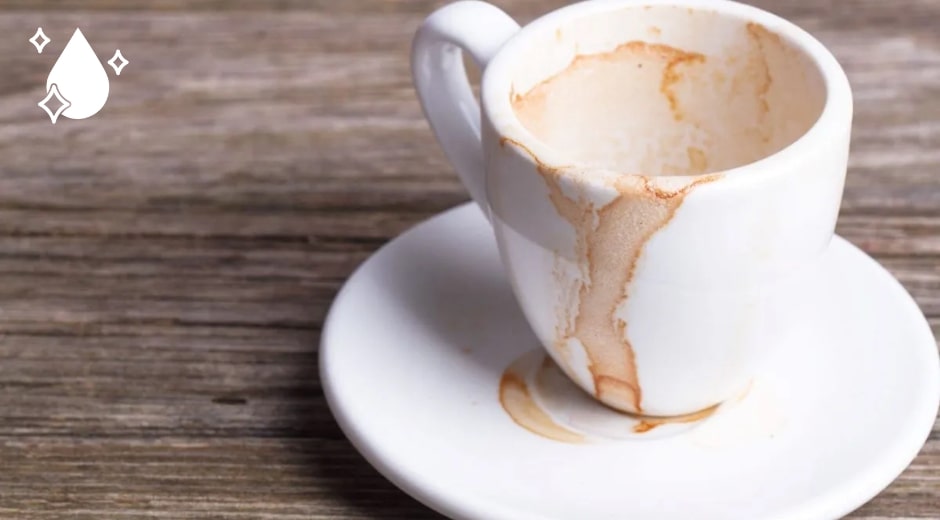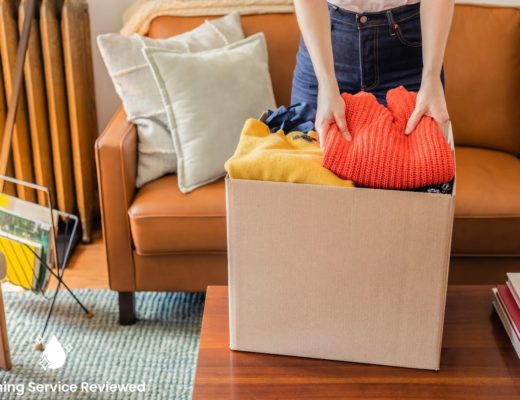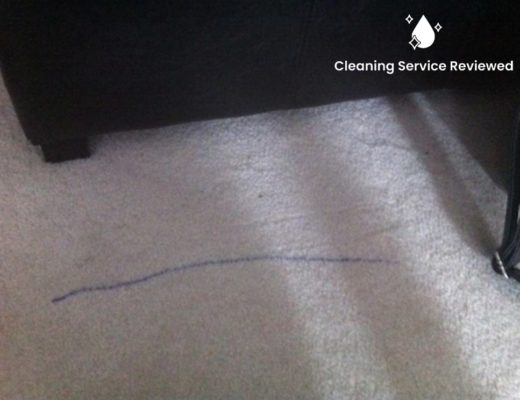Coffee stains on your favorite mug can be a common frustration for coffee lovers. But fear not!
You can easily restore your coffee cups to their former glory with the right tools and techniques.
In this guide, we’ll show you how to remove stains from coffee cups and keep them looking pristine.
Why do coffee cups get stained?

Coffee cups can develop stubborn stains due to these two primary culprits:
- Tannins: The main reason your coffee cups end up with unsightly stains is the coffee itself. Coffee contains natural compounds known as tannins.
While these tannins are responsible for the strong and flavorful quality of your coffee, they’re also the reason why your coffee cups get stained.
Tannins like sticking to surfaces. So, when they touch the inside of your cup, they grab on tight into it and leave behind those annoying brown stains that are hard to get rid of.
- The Material of the Cup: Another factor that influences coffee cup staining is the material from which the cup is made.
Some coffee cups, especially those made from porous materials like ceramic and unglazed pottery, are more susceptible to staining. This is caused by the microscopic pores and imperfections on the cup’s surface.
When you pour coffee into these types of cups, the liquid seeps into these tiny pores. Over time, coffee residue accumulates within these porous surfaces and creates a perfect environment for stains to stay.
This is why even diligent cleaning can sometimes fail to fully remove stains from such types of cups, as the coffee has effectively penetrated the cup’s material.
How to Remove Stains from Coffee Cups
Method 1. Baking Soda

| Difficulty | Easy |
| Number of steps | 4 |
| Time to perform fix | 3-5 minutes |
| Things you need | Baking soda, sponge, dishwashing liquid, water |
Step 1: Begin by putting about one-fourth cup of baking soda into the cup and mixing it with one-fourth teaspoon of water to create a paste.
Step 2: Once you have your paste, dampen a sponge with water and start scrubbing the interior of the cup. The baking soda works as a mild abrasive and gently lifts the stains.
Step 3: Afterward, rinse the paste away, and if any stains persist, repeat the process.
Step 4: Once the stains are gone, proceed to wash the cup as you normally would, leaving it spotless and ready for your next brew.
Method 2. Baking Soda and Vinegar

| Difficulty | Easy |
| Number of steps | 3 |
| Time to perform fix | Approximately 12 minutes |
| Things you need | Baking soda, vinegar, warm water, sponge |
Step 1: Fill your cup halfway with warm water and add two teaspoons of baking soda.
Step 2: Next, top it with vinegar, and allow it to sit for approximately 10 minutes. If the solution gets fizzy and bubbly, it’s a sign that you mixed the ingredients correctly.
Step 3: Rinse and drain the mug, and scrub away any lingering stains to reveal a stain-free surface.
Method 3. Boiling Water and White Vinegar

| Difficulty | Easy |
| Number of steps | 4 |
| Time to perform fix | Approximately 12 minutes |
| Things you need | Boiling water or hot tap water, white vinegar, sponge |
Step 1: Start by filling your mug halfway with either boiling water or very hot tap water and top it off with white vinegar.
Step 2: Allow this mixture to soak for 10 minutes.
Step 3: After that, dispose of the vinegar water down the sink and proceed to scrub the now-empty mug using an abrasive sponge.
Step 4: Rinse the mug thoroughly with clean water, and your mug will now be free from stains.
Method 4. Denture Tablets

| Difficulty | Easy |
| Number of steps | 5 |
| Time to perform fix | Approximately 35 minutes |
| Things you need | Denture tablets, warm water, sponge, dishwashing liquid |
Step 1: Start by filling each of your coffee cups or mugs with warm water.
Step 2: Break each denture tablet and drop one-half of the tablet into each cup.
Step 3: Let the cups soak for a minimum of 30 minutes. You may also leave them for several hours or overnight.
Step 4: After that, pour out the solution and proceed to scrub the inside of each cup using the rough side of a sponge.
Step 5: Finally, give them a regular wash, and they’ll be good to go.
Method 5. Chlorine Bleach

| Difficulty | Easy |
| Number of Steps | 4 |
| Time to perform fix | At least 2 hours |
| Things you need | Container, warm water, chlorine bleach, rough sponge, dishwashing liquid |
Step 1: Start by filling a container with warm water and add one tablespoon of chlorine bleach for each gallon of water.
Step 2: Place the stained cups or mugs into the solution and let them soak for a minimum of two hours. You may also leave them overnight if you wish.
Step 3: After soaking, carefully take the mugs out of the bleach solution and dispose of the bleach water safely.
Step 4: Use the abrasive side of a sponge to scrub the interiors of the mugs and give them a regular wash before using them as usual.
Method 6. Salt and Ice

| Difficulty | Easy |
| Number of steps | 3 |
| Time to perform fix | Approximately 3 minutes |
| Things you need | Salt, crushed ice, plastic wrap, water |
Step 1: Start by pouring some salt into the bottom of your mug, then add a handful of crushed ice on top.
Step 2: Cover the mug securely with several layers of plastic wrap and give it a good shake. The coarse salt, when combined with the ice, effectively scrubs away the coffee stains without the need for any chemicals.
Step 3: After shaking, rinse the mug thoroughly with clean water, and you’ll find it free from stains.
Method 7. Melamine Sponge

| Difficulty | Easy |
| Number of steps | 3 |
| Time to perform fix | Approximately 5 minutes |
| Things you need | Melamine sponge, water |
Step 1: Begin by wetting a melamine sponge with water.
Step 2: Gently scrub the inside of your cup, and while you’re doing this, you’ll notice the stains transferring from the cup to the sponge.
Step 3: After this, make sure to rinse the mug thoroughly, and then wash it as you normally do.
Preventing Coffee Cup Stains
Regular Cleaning Habits

Regular cleaning is your first line of defense against coffee stains. It’s a simple but highly effective strategy.
Make it a habit to rinse your coffee cups immediately after use. This quick rinse helps prevent coffee residues from drying and sticking to the cup’s surface.
When you wash away the leftover coffee quickly, it minimizes stains from getting really stuck on your cups as time goes on.
Also, use a bottle brush to clean the insides of travel mugs or tall and slender cups that can be challenging to reach with your hand.
Consider using stain-resistant mugs

If you want to take your stain-prevention game to the next level, consider using stain-resistant mugs. Not all coffee cups are created equal.
Investing in cups made from materials known for their stain-resistant properties can be a game-changer. Choose materials like glazed ceramic or stainless steel.
These materials have surfaces that are less porous, meaning they provide fewer sticking spots for coffee residue. As a result, stains are less likely to develop and, if they do, they tend to be easier to remove.
Stain-resistant mugs not only save you the hassle of frequent stain removal but also ensure your coffee cups look brand new for much longer.



